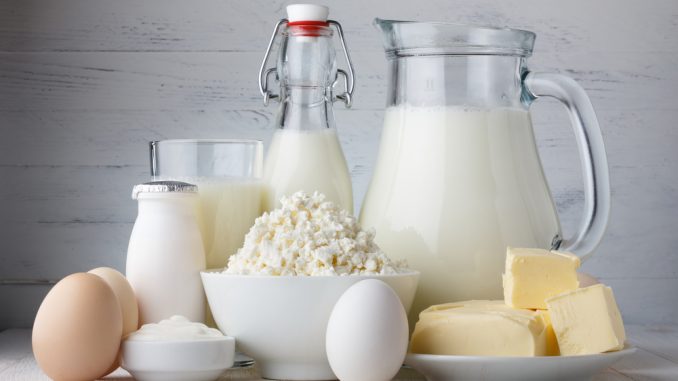
One food group that’s far too often cut out of many people’s diet plan is dairy. Dairy often gets a bad rep with many people believing that if you choose to eat it, you’ll put yourself at a high risk for weight gain. Likewise, many people have come to believe that they’re lactose intolerant and as such, avoid dairy at all costs.
But, the truth is that neither of these are entirely accurate. First, dairy can most certainly be a part of a healthy weight management or weight loss diet plan. Secondly, if you know your body, you might just find that certain types of dairy don’t set off your lactose intolerance like other varieties do.
But why should you eat dairy? What does it have to offer you? Let’s look at six reasons you should be including dairy in your diet plan so that you can better understand why it deserves a place.
Increased Protein Intake
The first reason to add dairy into your diet is because it’s a terrific source of protein. Provided you are choosing higher quality dairy products that aren’t loaded with fat, you’ll actually take in anywhere between 10-20 grams of protein per serving of dairy, which can go a long way towards meeting your daily requirements.
For those who aren’t big on eating animal protein sources (such as chicken, turkey, steak etc.), adding dairy to their day could mean the difference between them meeting their protein needs or falling short.
The increased protein will then go on to help improve your blood glucose control, decrease hunger, while also helping you recover from any activities you may be taking part in.
Stronger Bones
Do you want strong bones? It’s time to get that dairy in. Dairy is the best source of calcium in the human diet as it’s the most readily absorbed. While you can get calcium from plant sources such as spinach or kale, it won’t be nearly as beneficial to your bones as calcium from dairy is.
If osteoporosis runs in your family or you are concerned about stress fractures and/or breaks, it’s important that you include dairy in your diet. Some people choose to supplement with calcium instead and while this can help to some degree, it’s still not as good as getting the calcium in from whole food sources. One serving of milk, for instance, will provide up to a third of your total recommended daily calcium intake.
Fat Burning Properties
When most people think of dairy, they tend to think of weight gain, not loss. But really, you can lose weight consuming dairy as well. The trick is choosing the right variety. Sure, if you feast on ice cream, hard cheese, or other high fat dairy products, you won’t be keeping your body slim. But, if you choose low fat varieties of Greek yogurt, skim milk, or reduced fat cheese varieties, you can certainly include those foods in your diet while keeping your calorie and fat intake in check.
What’s more is that those who consume dairy as part of their reduced calorie fat loss plan tend to show greater fat loss from the abdominal region as well. Meaning, you might just notice that you store less belly fat when consuming dairy. This is thanks to the protein and calcium combination that dairy provides. However, you can’t reap the same benefit from consuming other sources of protein (such as chicken) and supplementing with calcium. It’s the unison together in dairy that appears to offer this benefit.
Those who have a higher consumption of dairy in their diet plan tend to have reduced waistlines and may also have a lower risk factor for suffering from metabolic syndrome compared to others consuming less dairy. Additionally, as body fat is lost, this can also lower your risk factor for other obesity-related diseases such as diabetes and heart disease.
Greater Satiety
An often unmentioned benefit of dairy is the fact that it offers excellent satiety. This refers to how hungry you feel after consuming a particular food item. One form of dairy – cottage cheese – contains casein protein, which is a slow-releasing protein. Eat some cottage cheese and your body will be working hard for hours breaking down that food. This makes it an ideal snack to consume before bed time.
The longer your food is digesting, the less hunger you tend to feel between meals.
Whey protein powder also offers high satiety benefits. Those who consume whey protein powder between meals tend to consume fewer calories at their next meal, illustrating the high satiety that protein powder offers. Since your success or failure of your diet is, in part, determined by your reduced calorie intake, this is one benefit not to overlook. Anything that makes you less hungry throughout the day is going to work in your favor in terms of keeping your weight loss on track.
Vitamin D Intake
Another big benefit of dairy is the fact that it is a good source of vitamin D. Milk, as well as some yogurt varieties, are fortified with vitamin D. This nutrient is not found in many foods at all, and while you can manufacture it naturally with direct sunlight exposure, it is always helpful to include it in your diet.
Getting sufficient vitamin D in your diet has a long line-up of benefits. First, it’ll help to boost bone strength. Vitamin D works with calcium to maintain the structural integrity of your bones, reducing your risk factor for stress fractures and breaks.
In addition to this, vitamin D is also imperative for muscular force and development. Those who are lacking in vitamin D may notice they start feeling quite a bit weaker in the gym or whenever they engage in athletic events. Vitamin D may also help combat certain diseases such as Parkinson’s disease, cancer, as well as multiple sclerosis. Finally, it’s also great for boosting brain health.
All in all, you do not want to let yourself fall short in vitamin D intake, yet far too many people do. This is partly because they are cutting dairy from their diet plan. By making sure to include it, you can ramp up your intake of this nutrient and see how much better you feel.
Convenient
Finally, the last reason to include dairy in your diet plan is quite simply because it’s fast and convenient. Dairy requires no cooking at all, so it’s a grab-and-go type of food. A glass of milk or a small bowl of yogurt can easily work as a snack on the run, and with the portable options now available, you can easily pack these to take with you to school, work, or wherever your day may lead you. If lack of time is one of your primary reasons for not eating right, dairy can help you overcome this excuse and make sure that you keep your diet on track.
So there you have some of the biggest benefits to adding dairy to your diet plan. It’s not a food to be feared, provided you are making smart choices on which varieties to eat. When selecting dairy products, the main point to keep in mind is total calorie content along with total sugar and fat content. You want to stay away from high fat hard cheeses, which contain too much saturated fat as well as calories to be healthy. If you can find a reduced fat cheese variety, which may be more appropriate to include in a diet to keep you lean. Likewise, opt for skim or 1% milk over whole milk. This will help keep the protein to calorie ratio higher while decreasing the overall fat content. While you do need fat in your diet, the fat from whole milk is not the type that you want to overload on.
When selecting cottage cheese, look for reduced sodium varieties. This form of cheese can be quite high in salt, but is generally much lower in total fat, so it’s the salt that you want to monitor for. And finally, when selecting yogurt, you want to choose a lower fat variety. However, be sure to look at the sugar content. Many yogurt varieties contain a high dose of added sugar (often in the form of ‘flavoring’), so opting for plain, lower sugar varieties will be the best option. If you keep these quick tips in mind, you can be sure that you are choosing smart dairy options and promoting a healthy, lean body in the process.
